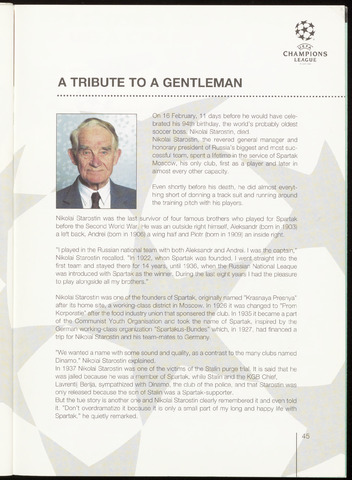A TRIBUTE TO A GENTLEMAN
CHAMPIONS
LEAGUE
On 16 February, 11 days before he would have cele
brated his 94th birthday, the world's probably oldest
soccer boss/Nikolai Starostin, died.
Nikolai Starostin, the revered general manager and
honorary president of Russia's biggest and most suc
cessful team, spent a lifetime in the service of Spartak
Moscow, his only club, first as a player and later in
almost every other capacity.
Even shortly before his death, he did almost everyt
hing short of donning a track suit and running around
the training pitch with his players.
Nikolai Starostin was the last survivor of four famous brothers who played for Spartak
before the Second World War. He was an outside right himself, Aleksandr (born in 1903)
a left back, Andrei (born in 1906) a wing half and Piotr (born in 1909) an inside right,
"I played in the Russian national team with both Aleksandr and Andrei. I was the captain,"
Nikolai Starostin recalled. "In 1922, when Spartak was founded, I went straight into the
first team and stayed there for 14 years, until 1936, when the Russian National Leaque
was introduced with Spartak as the winner. During the last eight years I had the pleasure
to play alongside all my brothers."
Nikolai Starostin was one of the founders of Spartak, originally named "Krasnaya Presnya"
after its home site, a working-class district in Moscow. In 1926 it was changed to "Prom
Korporatie" after the food industry union that sponsered the club. In 1935 it became a part
of the Communist Youth Organisation and took the name of Spartak, inspired by the
German working-class organization "Spartakus-Bundes" which, in 1927, had financed a
trip for Nikolai Starostin and his team-mates to Germany.
"We wanted a name with some sound and quality, as a contrast to the many clubs named
Dinamo," Nikolai Starostin explained.
In 1937 Nikolai Starostin was one of the victims of the Stalin purge trial. It is said that he
was jailed because he was a member of Spartak, while Stalin and the KGB Chief,
Lavrentij Berija, sympathized with Dinamo, the club of the police, and that Starostin was
only released because the son of Stalin was a Spartak-supporter.
But the tue story is another one and Nikolai Starostin clearly remembered it and even told
it. "Don't overdramatize it because it is only a small part of my long and happy life with
Spartak," he quietly remarked.
45

